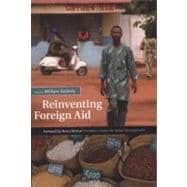
Note: Supplemental materials are not guaranteed with Rental or Used book purchases.
Purchase Benefits
What is included with this book?
| Foreword | p. ix |
| Introduction: Can't Take It Anymore? | p. 1 |
| The Power of Scientific Evaluation-And Why Isn't It Done More Often? | p. 45 |
| Making Aid Work | p. 47 |
| Use of Randomization in the Evaluation of Development Effectiveness | p. 93 |
| It Pays to Be Ignorant | p. 121 |
| A Simple Political Economy of Rigorous Program Evaluation | |
| The Problems of Aid-Financed Delivery of Public Services | p. 145 |
| The Gordian Knot of the State | |
| Solutions When the Solution Is the Problem | p. 147 |
| Arraying the Disarray in Development | |
| Donors and Service Delivery | p. 179 |
| The Illusion of Sustainability | p. 201 |
| An Aid-Institutions Paradox? | p. 255 |
| A Review Essay on Aid Dependency and State Building in Sub-Saharan Africa | |
| Dysfunctional Donors and How to Reform Them | p. 283 |
| Why Do Aid Agencies Exist? | p. 285 |
| Absorption Capacity and Disbursement Constraints | p. 311 |
| Donor Fragmentation | p. 333 |
| The Imf and World Bank | p. 349 |
| The IMF and Economic Development | p. 351 |
| The Knowledge Bank | p. 377 |
| Debt Relief and Fiscal Sustainability for Heavily Indebted Poor Countries | p. 399 |
| Imagining New Forms of Foreign Aid | p. 415 |
| Making Vaccines Pay | p. 417 |
| Can We Build a Better Mousetrap? | p. 431 |
| Three New Institutions Designed to Improve Aid Effectiveness | |
| In Conclusion: The Big Picture | p. 503 |
| Avoid Hubris: And Other Lessons for Reformers | p. 505 |
| Seven Deadly Sins: Reflections on Donor Failings | p. 515 |
| Contributors | p. 553 |
| Index | p. 555 |
| Table of Contents provided by Publisher. All Rights Reserved. |
The New copy of this book will include any supplemental materials advertised. Please check the title of the book to determine if it should include any access cards, study guides, lab manuals, CDs, etc.
The Used, Rental and eBook copies of this book are not guaranteed to include any supplemental materials. Typically, only the book itself is included. This is true even if the title states it includes any access cards, study guides, lab manuals, CDs, etc.